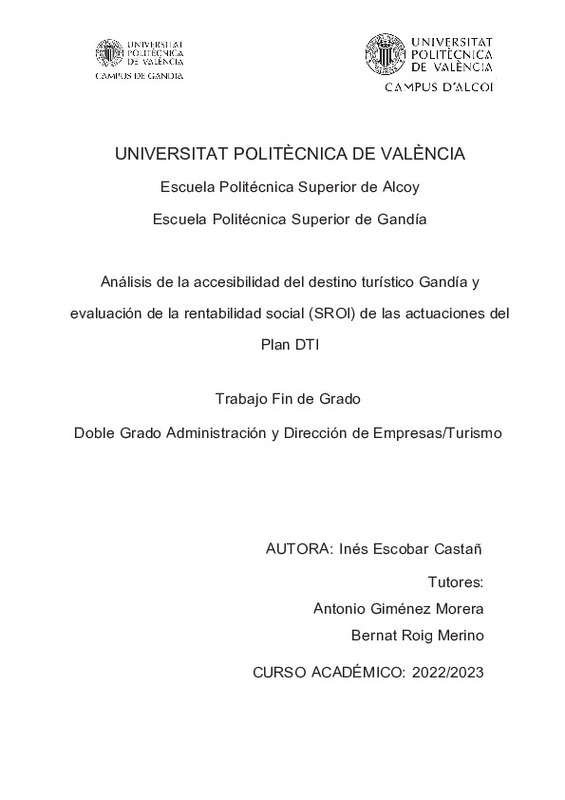JavaScript is disabled for your browser. Some features of this site may not work without it.
Buscar en RiuNet
Listar
Mi cuenta
Estadísticas
Ayuda RiuNet
Admin. UPV
Análisis de la accesibilidad del destino turístico Gandia y evaluación de la rentabilidad social (SROI) de las actuaciones del Plan DTI
Mostrar el registro sencillo del ítem
Ficheros en el ítem
| dc.contributor.advisor | Giménez Morera, Antonio
|
es_ES |
| dc.contributor.advisor | Roig Merino, Bernat
|
es_ES |
| dc.contributor.author | Escobar Castañ, Inés
|
es_ES |
| dc.date.accessioned | 2023-10-19T11:13:55Z | |
| dc.date.available | 2023-10-19T11:13:55Z | |
| dc.date.created | 2023-07-26 | |
| dc.date.issued | 2023-10-19 | es_ES |
| dc.identifier.uri | http://hdl.handle.net/10251/198377 | |
| dc.description.abstract | [ES] La accesibilidad universal abarca mucho más que la discapacidad, es un horizonte de bienestar e inclusión que puede aportar un profundo beneficio para toda la sociedad. Es en este contexto donde surge el modelo de "Turismo Accesible", que posteriormente se enriquece con el concepto de "Turismo Inclusivo", abarcando así una gama más amplia de aspectos sociales. Si la condición de inteligencia en un destino turístico viene dada por la combinación de tecnología, innovación y sostenibilidad, para este tercer aspecto es imprescindible, tratar la sostenibilidad social y, dentro de ella, la accesibilidad e inclusión social. La sostenibilidad social y la accesibilidad son pilares interconectados que promueven la igualdad de oportunidades y el bienestar inclusivo en la sociedad, y que por tanto son cruciales en un destino turístico inteligente. Es por ello que en este Trabajo de Fin de Grado se estudia la situación actual del destino turístico inteligente Gandia desde el punto de vista de la accesibilidad mediante la metodología Mental Models, para comparar el punto de vista y las opiniones de tres grupos de stakeholders de la localidad: sector privado turístico, sector público y colectivos del ámbito de la accesibilidad. Además, se propone una metodología basada en el SROI (retorno social de la inversión) para calcular la rentabilidad social de las actuaciones realizadas por el Ayuntamiento de Gandia en materia mejora de la accesibilidad del municipio en el marco del Plan Destino Turístico Inteligente 2020-2025. | es_ES |
| dc.description.abstract | [EN] Universal accessibility encompasses much more than disability, it is a horizon of well-being and inclusion that can provide profound benefits for society. It is in this context where the "Accessible Tourism" model arises, which is later enriched with the concept of "Inclusive Tourism", thus covering a broader range of social aspects. If the intelligence aspect in a tourist destination is given by the combination of technology, innovation and sustainability, it is essential for this third party to address social sustainability. Social sustainability and accessibility are interconnected pillars that promote equal opportunities and inclusive well-being in society and are therefore crucial in a smart tourism destination. That is why in this Final Degree Project the current situation of the smart tourist destination Gandia is studied from the point of view of accessibility, through collaboration with representatives of important groups related to the sector, selected based on the Mental Models methodology for the establishment of stakeholders. In addition, measurement is needed to build sustainable improvements over time, so there are also analyzed the possible tools with which it is possible to calculate the social profitability of the actions carried out by Turisme Gandia in terms of accessibility. . | es_ES |
| dc.format.extent | 90 | es_ES |
| dc.language | Español | es_ES |
| dc.publisher | Universitat Politècnica de València | es_ES |
| dc.rights | Reserva de todos los derechos | es_ES |
| dc.subject | Impacto social | es_ES |
| dc.subject | Destinos turísticos inteligentes | es_ES |
| dc.subject | Turismo accesible | es_ES |
| dc.subject | Turismo Inclusivo | es_ES |
| dc.subject | Smart Tourism Destinations | es_ES |
| dc.subject | Accessible Tourism | es_ES |
| dc.subject | Inclusive Tourism | es_ES |
| dc.subject | Social impact | es_ES |
| dc.subject.classification | COMERCIALIZACION E INVESTIGACION DE MERCADOS | es_ES |
| dc.subject.other | Grado en Administración y Dirección de Empresas-Grau en Administració i Direcció d'Empreses | es_ES |
| dc.title | Análisis de la accesibilidad del destino turístico Gandia y evaluación de la rentabilidad social (SROI) de las actuaciones del Plan DTI | es_ES |
| dc.title.alternative | Analysis of the accessibility of the Gandia tourist destination and evaluation of the Social Return on Investment (SROI) of the STD Plan actions | es_ES |
| dc.title.alternative | Anàlisi de l'accessibilitat de la destinació turística Gandia i avaluació de la rendibilitat social (SROI) de les actuacions del Pla DTI | es_ES |
| dc.type | Proyecto/Trabajo fin de carrera/grado | es_ES |
| dc.rights.accessRights | Abierto | es_ES |
| dc.contributor.affiliation | Universitat Politècnica de València. Departamento de Economía y Ciencias Sociales - Departament d'Economia i Ciències Socials | es_ES |
| dc.contributor.affiliation | Universitat Politècnica de València. Escuela Politécnica Superior de Alcoy - Escola Politècnica Superior d'Alcoi | es_ES |
| dc.description.bibliographicCitation | Escobar Castañ, I. (2023). Análisis de la accesibilidad del destino turístico Gandia y evaluación de la rentabilidad social (SROI) de las actuaciones del Plan DTI. Universitat Politècnica de València. http://hdl.handle.net/10251/198377 | es_ES |
| dc.description.accrualMethod | TFGM | es_ES |
| dc.relation.pasarela | TFGM\156244 | es_ES |
Este ítem aparece en la(s) siguiente(s) colección(ones)
-
EPSA - Trabajos académicos [5826]
Escuela Politécnica Superior de Alcoy





![ZIP archive [ZIP]](/themes/UPV/images/zip.png)

